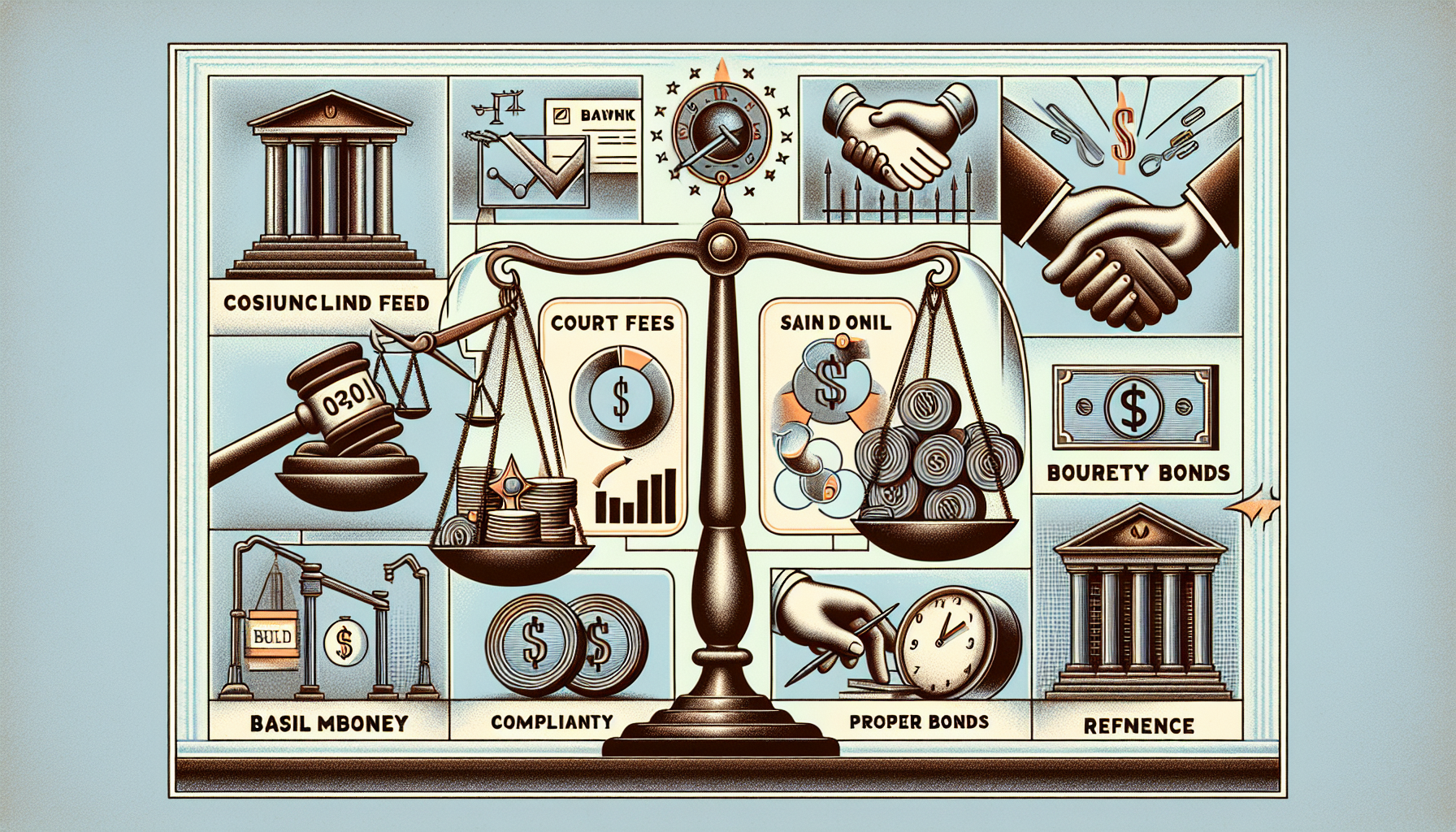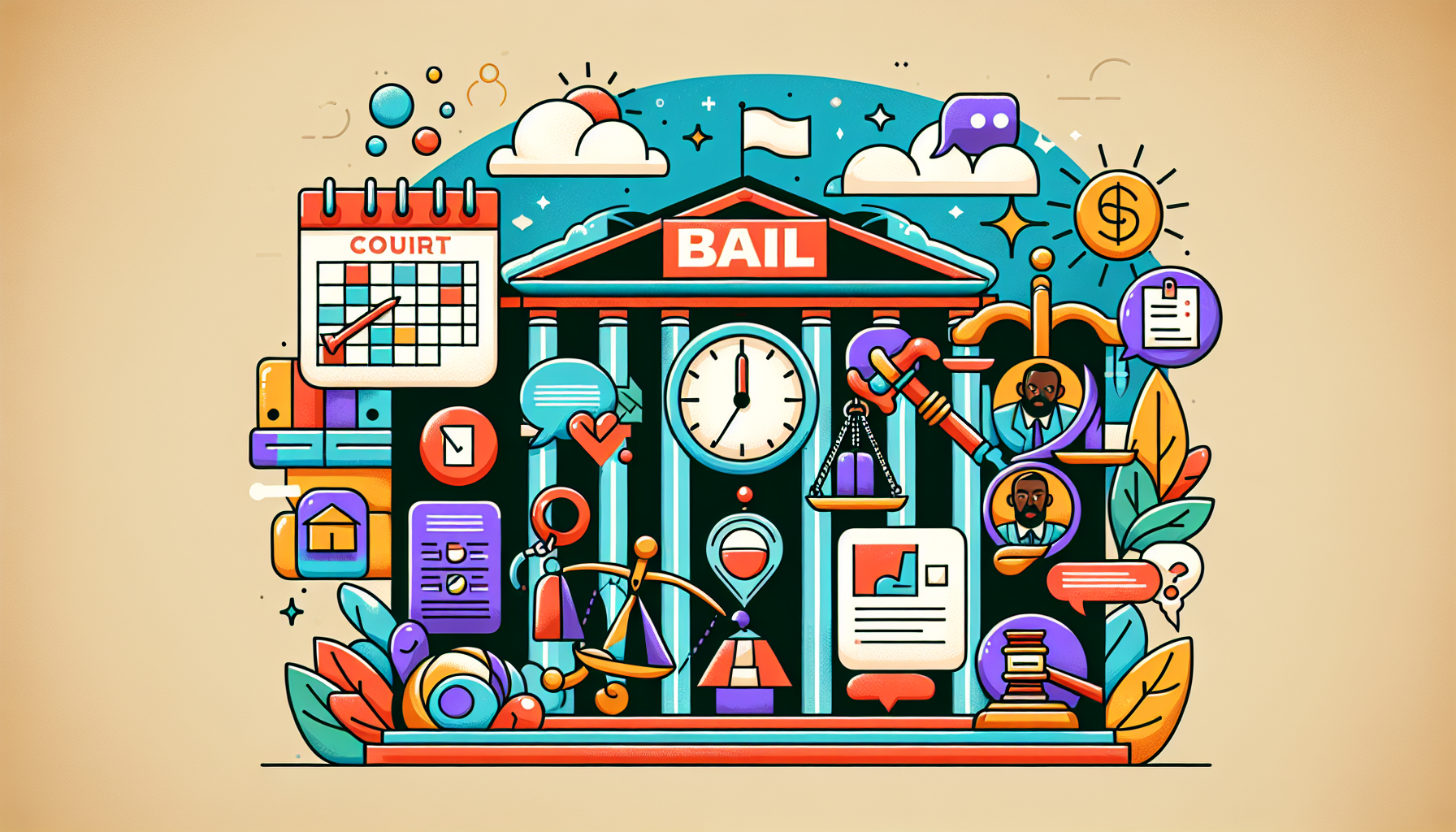How Long Does It Take to Get Bail Money Back? Do You Get Bail Money Back After Court?
Wondering if and how long does it take to get bail money back? Do you get your bail money back if you comply with all court requirements? You can expect to get your bail money back within 4 to 6 weeks. This guide will explain the types of bail, the refund process, and factors that could affect your refund.
Key Takeaways
- Bail types include cash bail, bail bonds, and property bonds, each with distinct refund processes and timelines.
- Cash bail refunds typically occur within 2 weeks after the conclusion of the court case, while bail bond premiums are non-refundable.
- Adherence to court appearances and conditions is critical for securing bail refunds; failure to comply can result in forfeiture of the bail amount.
Understanding Bail Money and Refunds
Bail functions as a critical component within the criminal justice system, enabling individuals accused of crimes to retain their freedom while they await trial proceedings. The bail money serves as an assurance that the individual will attend all required court dates, thereby avoiding unnecessary pre-trial incarceration. Various forms of bail exist such as cash bail, property bonds, and utilizing services from a bail bondsman.
Understanding these different kinds of bail is crucial for grasping how one may go about obtaining a refund on their posted funds or collateral. Knowledge on whether you are posting full cash bail yourself—as can be done in Florida—employing the aid of a bond agent or securing release through property acts significantly towards setting expectations regarding financial returns upon case resolution.
Bail bond agents play a pivotal role in securing the return of bail money. Maintaining open communication with these agents is essential to navigate court procedures effectively, ensuring a smoother experience and increasing the chances of a successful refund.
We’ll delve into details concerning methods like cash bails, employing bondsmen services and leveraging real estate against legal charges next. Such information lays the groundwork necessary for comprehending when and how your invested sum might be returned after fulfilling obligations dictated by courts within this framework.
What is Cash Bail?
The concept of cash bail entails that either the defendant or their relatives must pay bail by providing the full bail amount in cash as a guarantee for release from detention. The principal aim of this system is to ensure compliance with court-mandated appearances at all subsequent legal proceedings by holding a financial stake against it. Should the individual fulfill all mandatory court dates, they receive reimbursement of their paid cash bail once legal matters are concluded, less any deductions pertaining to applicable court fees. To meet bail demands, there must be an immediate sum available in its entirety.
Conversely, neglecting to attend scheduled court appointments may lead to relinquishing the total amount put forth as bail—an act designed both as punitive and instructive measures emphasizing obedience to judicial directives.
How Do Bail Bonds Work?
A bail bond offers a feasible substitute for cash bail when the total bail is too steep to pay in full. In essence, this type of bond acts as a financial arrangement facilitated by a bail bond company that fronts the necessary funds to post bail and meet the set bail amount, consequently enabling the defendant’s release with minimal initial expense. The customary practice involves the defendant providing a non-refundable fee—typically close to 10% of the entire sum required for their release—as payment or compensation known as ‘bail bond money’ to secure services from these companies.
Securing such an agreement may necessitate collateral alongside this premium. It provides assurance and protection for both parties involved – particularly safeguarding against potential losses faced by the bondsman should there be instances where defendants do not abide by court directives post-release (i.e., skipping out on one’s appointed court date). It remains crucial that individuals looking into utilizing such services fully grasp these financial commitments as well as comprehend what is entailed within interactions involving any given ‘bail bondsman’ or agent representing them.
Property Bonds Explained
Using real estate as collateral, property bonds serve to secure the release of a defendant from custody. They provide an advantage for individuals lacking available cash but who possess valuable property holdings. Should the defendant adhere to all court-mandated appearances, their property bond will be discharged and any liens on the real estate removed, thus preserving their ownership.
Conversely, should the defendant fail in fulfilling their obligation to appear before the court, there exists a considerable risk that they could lose their collateralized property to seizure by the legal system. It underscores how crucial it is for defendants relying on property bonds to understand what’s at stake and ensure compliance with all judicial directives.
Timeline for Getting Bail Money Back

The period required to retrieve bail money can differ, depending on the form of bail utilized and individual case details. Typically, a refund for bail is processed within four to six weeks after the conclusion of the court proceedings. Yet this timeframe may be influenced by various factors specific to each category of bail.
Knowing what lies ahead can alleviate anxiety and aid in financial planning. It’s essential to grasp how refunds work along with their respective timelines whether you are navigating through cash bail, property bonds or working with a bail bonds service. Subsequent sections will delve into detailed explanations for each type of bail individually.
Cash Bail Refund Process
After the conclusion of a court case, processing refunds for cash bail spans about a fortnight. This repayment is commonly executed either through a check dispensed by the court or returned directly to the individual who made the payment. Nevertheless, it should be noted that reductions from this refund might occur due to outstanding obligations like unpaid court fees, costs associated with legal proceedings, or imposed criminal penalties.
To ensure receipt of the entire refund amount for bail paid in cash, strict adherence to all directives provided by the court and presence at every mandated hearing are imperative. Deviations from these requirements may cause postponements or diminishments in how much money is ultimately returned.
Bail Bond Refunds: What to Expect
In the context of bail bonds, it’s essential to understand that the premium paid to a bail bond company is not refundable. This charge, about 10% of the total bail amount set by the court, represents payment for services rendered by a bail bondsman. This fee remains non-refundable even if all required court appearances are made by the defendant.
Recognizing this detail is crucial for individuals contemplating securing a bail bond. The remaining portion of the full bail amount—which is backed by collateral—is only returned after fulfilling all judicial obligations and mandatory court attendance has been completed successfully.
Property Bond Release
Property bonds serve as a financial guarantee to ensure the defendant meets all court obligations. The lien placed on property used for collateral is only removed and the property restored to the defendant once these obligations have been fulfilled, thus safeguarding the court’s interests in securing compliance.
Understanding this sequence of events helps strategize more efficiently when considering the use of property bonds.
Factors Affecting Bail Money Refund

The return of bail money can be affected by numerous elements, such as the defendant’s adherence to mandated court appearances, the result of legal proceedings, and potential extra fees imposed by the court. The purpose behind requiring bail is to act as a monetary guarantee that individuals accused will abide by judicial directives and attend scheduled hearings in court. Provided these stipulations are satisfied, it’s customary for the pledged bail funds or assets to be refunded.
Nevertheless, it’s worth noting that deductions from returned bail might occur due to assorted costs or sanctions determined at the discretion of the court. Being aware of these considerations is beneficial for setting realistic expectations and ensuring full compliance with every directive issued by the court.
Court Appearance Compliance
In order to be eligible for a refund of bail money, it is crucial that you attend all the court appearances mandated by your case. Should you fail to show up for these appointments, not only could your eligibility for getting back the bail funds be compromised, but also missing any scheduled court appearance might lead to surrendering the entire amount of bail and potentially facing new charges. The forfeiture of bail happens when a defendant fails to meet their obligations under bail terms or if they decide to skip out on their bond.
Should there arise circumstances preventing you from making it to an appointed court date, promptly inform both your attorney and your bond agent about the situation. Discuss with them how you might reschedule the missed appearance in advance as a measure against losing your full stake in paid bail monies due to absence at required legal proceedings.
Legal Outcomes and Their Impact
The return of bail money can be affected by various legal outcomes, such as being found guilty, not guilty, having charges dropped or the case dismissed. A verdict of guilt does not alter the procedure for refunding bail if all stipulations are fulfilled. Yet unpaid court fees might be subtracted from this amount prior to reimbursement.
When a defendant is acquitted and declared not guilty, they receive their full bail money back. Should there exist any outstanding court fees that have gone unsettled, these may diminish the refunded amount. Similarly with dropped charges. In such instances, the returned bail could also address remaining court costs.
Upon dismissal of a case by the court system, defendants can expect their posted bail to be reimbursed without alteration.
Additional Court Fees and Deductions
It’s important to be aware that the amount returned from cash bail might not match the original sum paid because deductions for court fees could reduce it. Such deductions may encompass fines, outstanding court costs, and other expenses.
Understanding how various subtractions can influence the refund of your bail is crucial for setting realistic expectations and effectively organizing your financial matters.
Working with Bail Bondsmen

Engaging a bail bondsman and their agents can make the task of obtaining release from detention more straightforward. By providing the bail money, these bondsmen enable relatives and friends to circumvent the necessity of covering the entire bail amount immediately. Opting for a trustworthy bondsman is crucial in ensuring that any collateral offered as security for bail is eventually returned.
It’s vital to ensure that your chosen bondsman holds proper licensing and has a good reputation, which will greatly impact your experience with the bail process. The upcoming sections are designed to assist you in selecting an appropriate bondsman and comprehending how premiums on bail bonds operate.
Choosing the Right Bail Bondsman
Seek out a reputable bail bondsman who is known for their clear fee structure and willingness to clarify the intricacies of the bail bond process. Evaluate how well they understand the local judicial system, which can expedite the overall procedure of obtaining bail.
Rely on your intuition when choosing a bondsman. If there are any doubts or discomforts, it might be wise to look into other options. Engaging a trustworthy bail bondsman plays an essential role in ensuring that the process of securing release from detention through bail goes smoothly.
Understanding Bail Bond Premiums
Securing a bail bond involves a non-refundable fee known as the bail bond premium. Typically constituting about 10% of the total bail amount, this payment is rendered to the bail bondsman and covers the service charges of employing a bail agent.
Understanding what constitutes a bail bond premium is vital for individuals in need of such services, as it provides insight into the financial commitments required when opting to obtain a bailout through a bondsman.
Consequences of Failing to Appear in Court
It is imperative to attend every mandated court hearing in order to prevent any sanctions that might culminate in forfeiting bail money. Neglecting to show up for a scheduled court date can provoke the forfeiture of bail and result in legal consequences.
Not complying with established bail conditions could cause not just the surrender of your posted bail, but also attract additional legal penalties.
Surety Bonds as an Alternative
Surety bail offers a different pathway for posting bail, with a third party stepping in to assure that the defendant will appear in court. This option enables individuals to gain freedom without having the entire amount of cash required for bail on hand. Surety bail arrangements often involve a non-refundable bond premium and may require collateral. It provides an additional method through which defendants can manage their journey through the complex process of securing release.
Opting for surety bonds during this process helps individuals maintain liquidity, giving them flexibility to allocate or invest their resources elsewhere while satisfying the conditions set by the court regarding bail.
Tips for Ensuring Bail Money is Returned

Receiving a refund of your bail money is not solely dependent on paying the sum required for release. It also demands compliance with various stipulations and taking deliberate steps. The reimbursement of bail funds hinges on the defendant’s strict observance of all directives and terms set by the court. By consistently showing up to scheduled court dates and adhering to conditions associated with their release, defendants greatly enhance their prospects for recovering their posted bail.
Subsequent sections will offer comprehensive guidance on how to ensure punctuality at court hearings, adherence to the specific requirements imposed as part of one’s bail, as well as keeping an open line of communication with your assigned bail agent. These suggestions aim to assist you in smoothly maneuvering through the intricacies of the bail system while maximizing opportunities for obtaining a complete return on your financial commitment toward securing temporary freedom during legal proceedings.
Attend All Court Dates
Failing to appear for scheduled court appearances can have significant consequences, such as forfeiting bail money and incurring legal sanctions. It is crucial to be present at every court date in order to ensure the reimbursement of bail.
Should there be circumstances that prevent you from attending a planned court appearance, promptly get in touch with your lawyer. By doing so, you might arrange an alternate date for the court proceeding and circumvent both monetary loss and additional penalties associated with failing to meet your legal obligations.
Comply with All Bail Conditions
Adhering to the conditions of bail set forth by the court is crucial for defendants to secure the refund of their bail money and prevent legal ramifications. These stipulations may include obligations like maintaining contact with a probation officer, adhering to travel limitations, or participating in mandated treatment programs.
Failure to observe these mandates can not only lead to forfeiture of your bail money, but also expose you to additional legal repercussions such as new criminal charges and potential fines or incarceration.
Communicate with Your Bail Agent
Maintaining consistent contact with your bail bond agent is essential to keep abreast of developments in your case. Regular interactions with the bail agent are necessary for keeping informed about upcoming court dates and what’s expected of you to comply with conditions. Engaging frequently with your bail bond agent can assist in monitoring duties and preventing errors that could put at risk any refunds of bail.
Open lines of communication will also facilitate a clearer understanding of court-related requirements and streamline managing the process concerning the return of bail funds.
Summary
Grasping the intricacies of how bail refunds work is crucial for anyone involved with the criminal justice system. It’s important to recognize the various forms of bail, understand when and how funds are returned, and know which factors might influence this process. Whether one encounters cash bail, uses a bail bond service, or relies on property bonds as collateral, each option comes with distinct obligations and timelines that must be followed.
It’s imperative to attend all required court appearances diligently adhere to any conditions attached to your release on bail, and keep open lines of communication with your appointed bail agent. These actions are vital in guaranteeing the return of your posted money for bail. By staying informed about these guidelines throughout every stage of engagement with the system, you can more adeptly steer through the complexities inherent in handling matters relating to securing a refund from ensuring both fiscal responsibility and legal propriety are maintained.
Frequently Asked Questions
How long does it take to get cash bail money back?
You can expect to receive your cash bail refund in approximately 2 to 3 months after your court case concludes.
It’s important to stay in touch with the court for any updates regarding your refund process.
Are bail bond premiums refundable?
Bail bond premiums are non-refundable, as they are considered a fee for the service provided by the surety.
What happens if I miss a court date?
Missing a court date can lead to the loss of your bail and may incur further legal consequences.
It is crucial to attend all scheduled court appearances to avoid these outcomes.
How do property bonds work?
Property bonds use real estate as collateral for a defendant’s release, ensuring that if they attend all court appearances, the bond is released and the property’s lien is removed.
This mechanism provides a secure way to ensure compliance while allowing access to the property.
What factors can affect my bail refund?
The process of receiving a bail refund can be influenced by your adherence to required court appearances, the final verdict or resolution of your case, and any extra fees levied by the court.
To facilitate an uncomplicated procedure for getting your bail money back, it is crucial to remain knowledgeable about these determinants.





